Online Reputation Management (ORM) software helps businesses control their online image. Here's what you need to know:
- ORM tools track brand mentions, analyze sentiment, and manage reviews
- They help businesses respond to feedback and boost positive content
- Key features include review monitoring, sentiment analysis, and reporting
- Popular ORM software options include Brand24, Grade.us, and Birdeye
Quick comparison of top ORM tools:
| Tool | Key Features | Price Range |
|---|---|---|
| Brand24 | Real-time tracking, sentiment analysis | $119-$399/mo |
| Grade.us | Review management, white-label option | $110+/mo |
| Birdeye | Review management, listings management | Custom pricing |
| Sprout Social | Social media management, review monitoring | $249-$499+/mo |
| DemandHub | Review generation, multi-channel communication | Quote-based |
| Thryv | CRM tools, review collection | $228-$533/mo |
| Yext | Local listing management, review tracking | $199-$999/year |
| Trustpilot | Review collection, trust score | $250+/mo |
| Podium | Messaging inbox, review management | $99-$349+/mo |
| Reputation.com | Reputation Score, AI-powered insights | Custom pricing |
Choose an ORM tool based on your business size, budget, and specific needs. Remember, actively managing your online reputation is crucial in today's digital landscape.
What is Online Reputation Management Software?
ORM software helps businesses keep tabs on their online image. It's like having a digital ear to the ground, listening to what people say about your brand across the internet.
Here's what it does:
- Spots brand mentions online
- Figures out if people are saying good or bad things
- Helps you handle customer reviews
- Shows you the big picture with easy-to-read reports
Why should you care? Well:
"58% of US adults say a company's reputation is a big deal when they're buying stuff."
And:
"83% of customers feel closer to brands that fix their problems."
ORM software helps you stay on top of this by:
1. Making reputation management easier
No more endless Google searches. ORM software does the heavy lifting for you.
2. Boosting customer relationships
Spot and solve problems fast. Turn frowns upside down.
3. Building trust
Show off your good reviews and tackle the bad ones head-on. It matters because:
"92% of consumers trust online reviews more than their friends' advice."
Here's a quick look at what ORM software can do:
| Feature | What it does for you |
|---|---|
| Review tracking | Keeps you in the loop about customer feedback |
| Sentiment check | Tells you if customers are happy or not |
| Quick responses | Helps you fix problems fast |
| Review boosting | Gets happy customers to spread the word |
| Smart reports | Shows you how to make your brand look better |
Remember, ORM software is just a tool. To make it work, you need a plan:
- Set up alerts for when people mention your brand
- Ask happy customers for reviews
- Have a plan ready for when things go south
How to Choose Reputation Management Software
Picking the right reputation management software can be tricky. Here's what to look for:
Size matters: The tool should fit your business. Small shops need different features than big companies.
Easy to use: You want a simple interface. Don't waste time figuring out the software.
Clear reports: Good software gives you insights about your brand's online image.
Support: Check if they offer help via chat, email, or phone.
Here's a quick comparison of key features:
| Feature | Why it matters | What to look for |
|---|---|---|
| Review tracking | Keeps you updated | Monitors multiple platforms |
| Sentiment analysis | Shows customer happiness | AI-powered accuracy |
| Response tools | Helps quick replies | Templates and automation |
| Review generation | Gets more positive reviews | Easy request system |
Price: Basic plans start around $131/month. Mid-range hit about $248, while top-tier can cost $400+.
"87% of reviewers say review monitoring is a highly-important feature."
This shows how crucial it is to track what people say about you online.
Extra tips:
- Try before you buy. Many offer free trials.
- Check if it works with your social media.
- For global businesses, look for multi-language tools.
Brand24
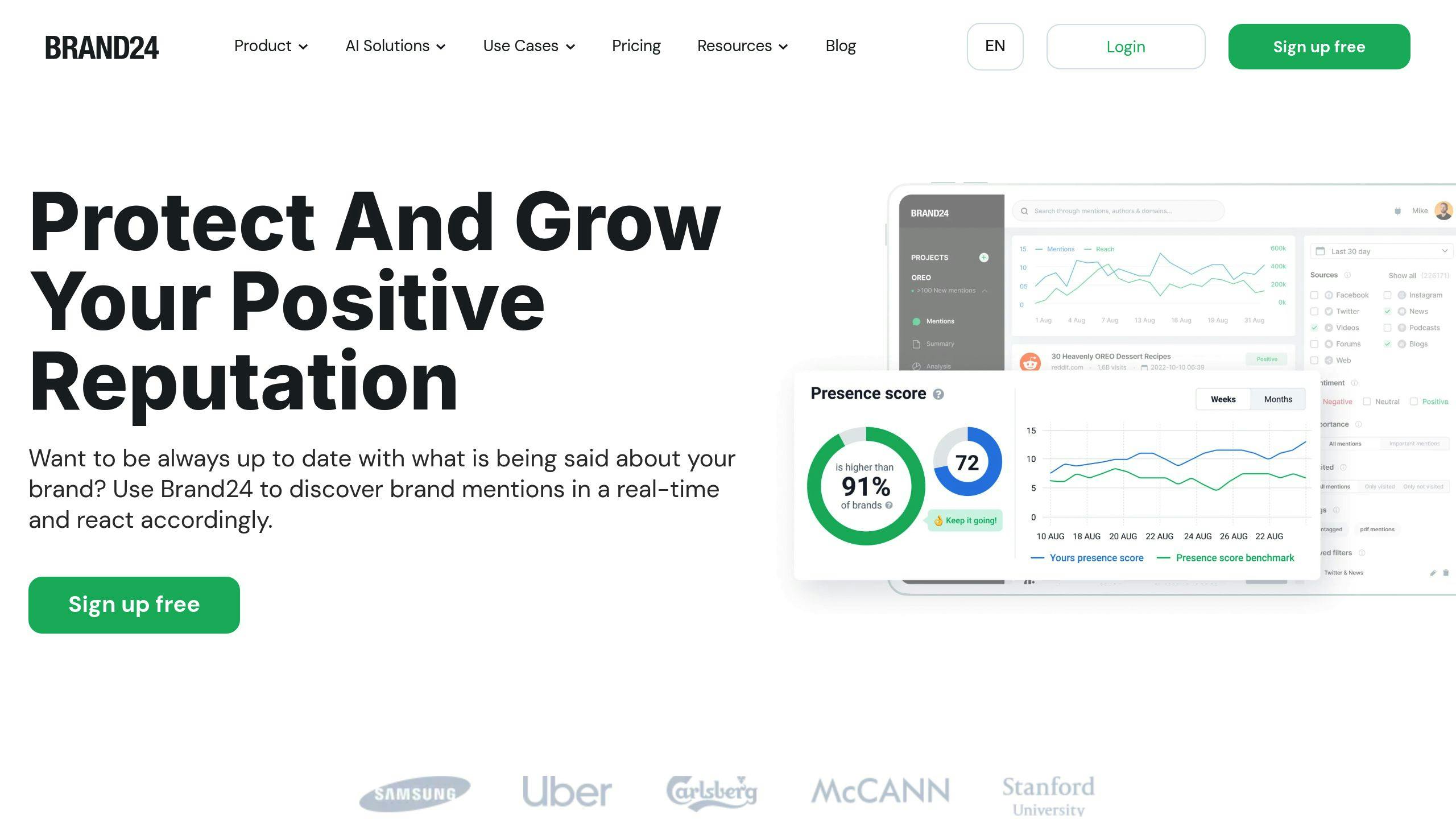
Brand24 tracks your online reputation across platforms. It's like having eyes and ears all over the internet, giving you the real scoop on what people are saying about your brand.
Here's what Brand24 brings to the table:
- Tracks mentions in real-time
- Analyzes sentiment
- Provides AI-powered insights
- Breaks down topics
- Identifies influencers
- Creates custom reports
The sentiment analysis is where Brand24 really shines. It sorts mentions into positive, negative, or neutral buckets. This gives you a quick pulse on how people feel about your brand.
For instance, when tracking TOMs Shoes, Brand24 spotted 66 positive mentions in one day. That's a lot! It made the team dig deeper to find out why.
Brand24 offers different plans:
| Plan | Monthly Cost | What You Get |
|---|---|---|
| Individual | $119 | 3 keywords, 1 user |
| Team | $159 | 7 keywords, unlimited users |
| Pro | $239 | 12 keywords, topic analysis, real-time updates, AI insights |
| Enterprise | $399 | 25 keywords, 100,000 mentions/month, podcast tracking |
Want to try before you buy? They offer a 14-day free trial, no strings attached.
Brand24 is known for being easy to use and having great customer support. It's perfect for PR pros and marketers who aren't tech wizards.
To get the most out of Brand24:
- Use real-time alerts to jump on feedback fast
- Let sentiment analysis guide your engagement strategy
- Find industry influencers for targeted outreach
In short, Brand24 is a solid choice for keeping tabs on your online reputation. It's comprehensive, user-friendly, and packs a punch with its analytics.
2. Grade.us
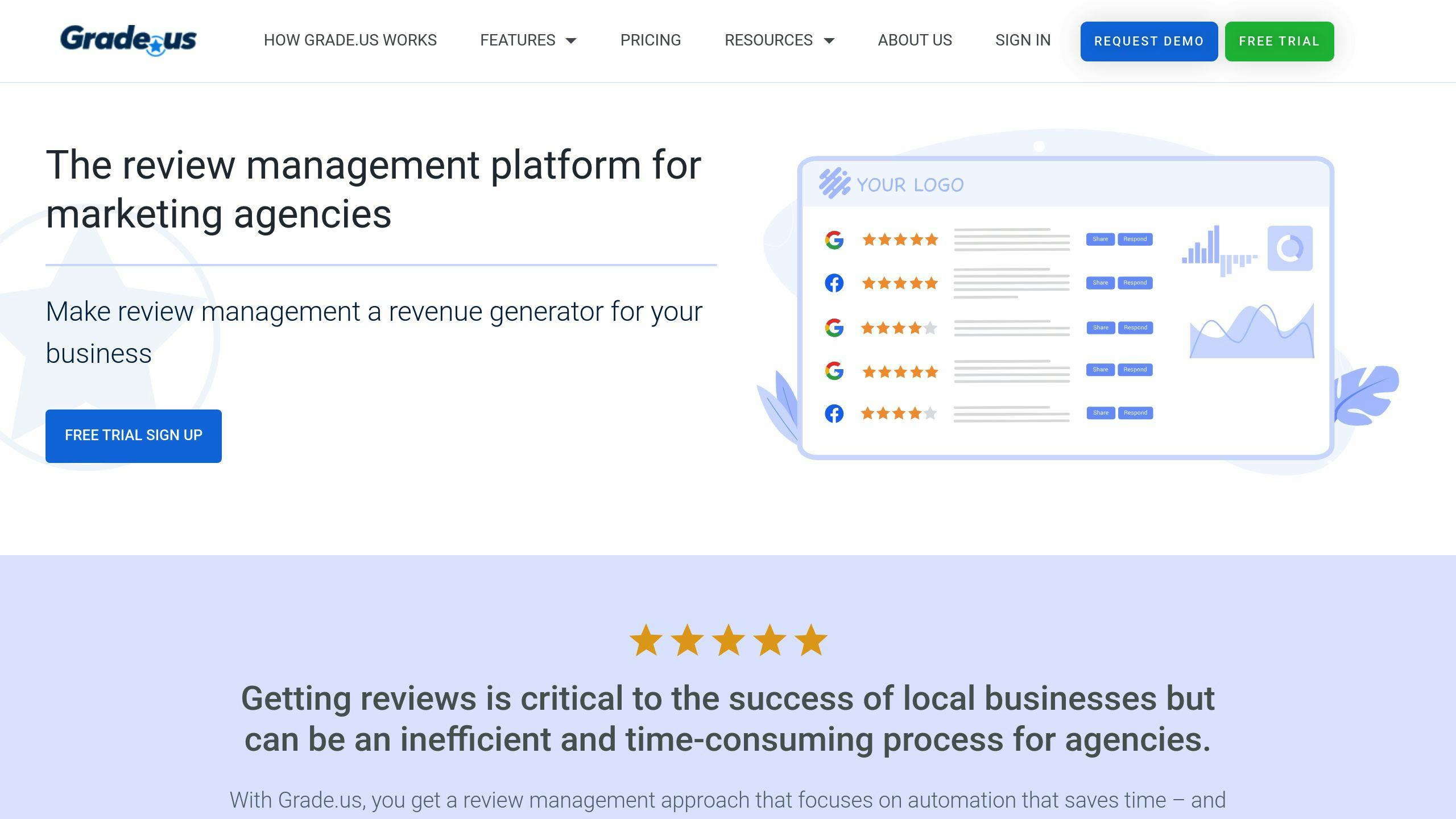
Grade.us is a review management tool for marketers, agencies, and enterprises. It's built to boost positive reviews where they count.
What Grade.us offers:
- Customizable campaigns
- Multi-location management
- White-label option
- Automation
- Support for 10 languages
Grade.us doesn't just collect reviews—it turns them into growth. It pulls reviews from different sites into one place, making monitoring easy.
For agencies, Grade.us is a potential money-maker. Offer it as a service to clients and you could see up to 70% profit margins.
Here's the pricing:
| Plan | Monthly Cost | Key Features |
|---|---|---|
| Basic | $110 | Review monitoring, review request campaigns |
| Pro | Custom pricing | White-label option, API access, advanced reporting |
Grade.us works with tools like Constant Contact, WordPress, and HubSpot CRM.
To get the most from Grade.us:
1. Use white-labeling to boost your brand with clients.
2. Use multi-location management to handle different client accounts efficiently.
3. Set up automated review requests to grow your review base steadily.
Grade.us stands out among reputation management tools. Its agency focus and potential for high-margin services make it ideal for managing multiple brands or locations.
3. Birdeye
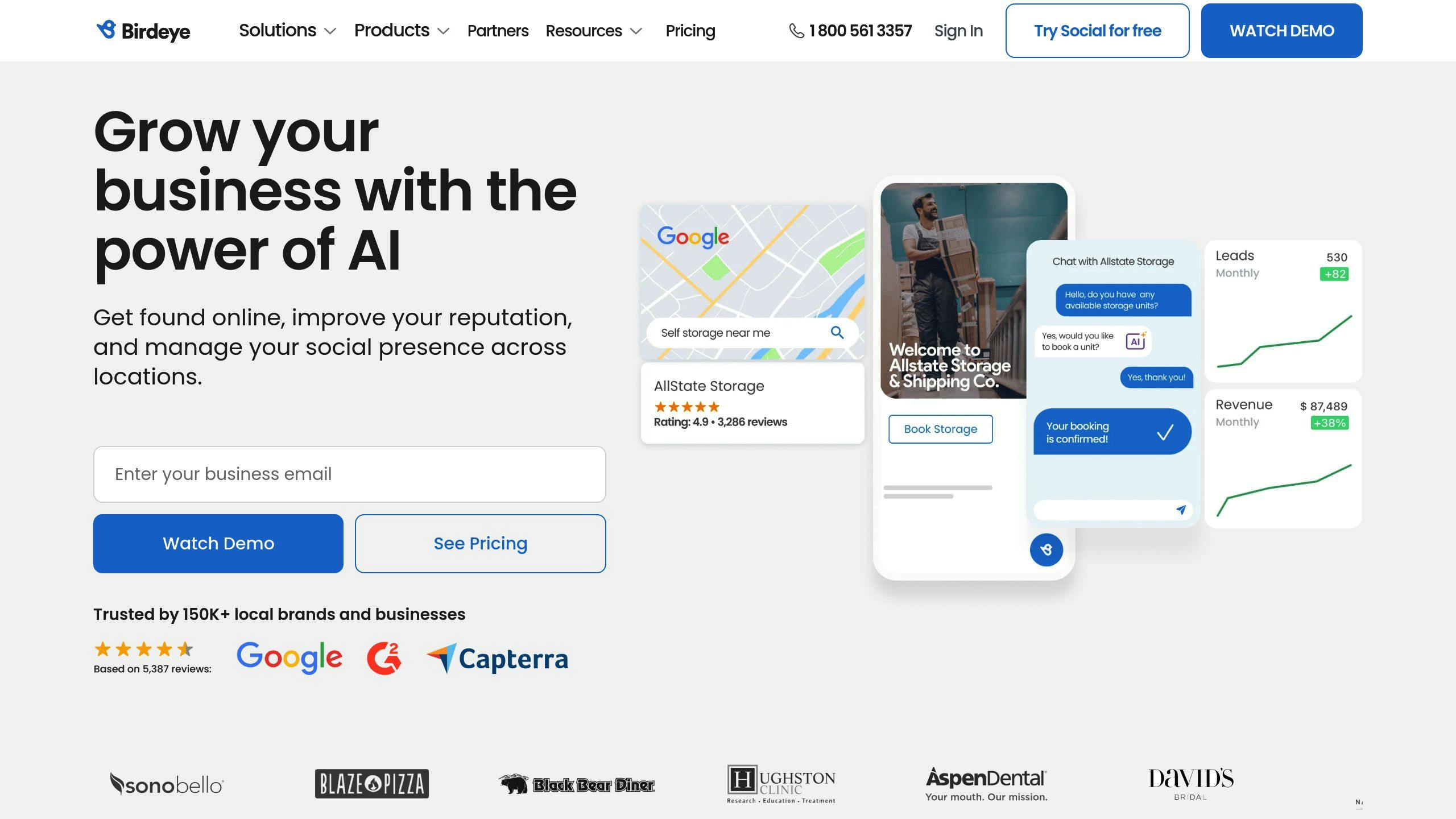
Birdeye isn't just another review management tool. It's a full-blown reputation powerhouse for businesses of all shapes and sizes.
What makes Birdeye special? It's got everything you need to polish your brand image:
- Review management across 200+ sites
- Listings management
- Social media marketing
- Customer surveys
- Referral generation
- Marketing automation
But here's the kicker: Birdeye doesn't just collect feedback. It ANALYZES it. Their AI can chew through thousands of survey responses faster than you can say "customer satisfaction."
And boy, do customers love it:
| Metric | Score |
|---|---|
| User satisfaction | 97% |
| User rating | 95% (based on 1,945 reviews) |
Don't just take our word for it. Here's what real businesses are saying:
"With Birdeye, we've increased our number of reviews by nearly 200% YoY, which has greatly contributed to brand lift and recall." - Brandon Dowdy-Ernst, Chief Experience Officer, Smile Workshop
Birdeye's automation is a game-changer. Set it up once, and it'll keep churning out review and referral requests based on triggers like purchases or appointments.
They offer three pricing tiers: Standard, Professional, and Premium. Each plan is tailored to your business needs.
Is it perfect? Not quite. Some users grumble about new features costing extra, and setting up listings can be a bit of a headache. But if you're serious about boosting your online rep, Birdeye's comprehensive toolkit is hard to beat.
4. Sprout Social

Sprout Social isn't just another social media tool. It's a powerhouse for managing your brand's online reputation.
Here's what Sprout Social brings to the table:
- Manage multiple social accounts from one dashboard
- Monitor and respond to reviews from Google, Facebook, and Yelp
- View all messages in one Smart Inbox
- Track brand mentions and keywords across social platforms
- Analyze sentiment about your brand
- Plan and schedule content with ease
Sprout Social offers four plans:
| Plan | Monthly Price | Social Profiles | Standout Features |
|---|---|---|---|
| Standard | $249 | 5 | Review management, keyword tracking |
| Professional | $399 | Unlimited | Competitor reports, workflows |
| Advanced | $499 | Unlimited | Content library, chatbots |
| Enterprise | Custom | Unlimited | Premium analytics, priority support |
All plans come with a 30-day free trial.
What sets Sprout Social apart? It integrates review management into your overall engagement strategy. This means you can build stronger customer relationships and boost your online reputation all in one place.
"63.6% of consumers check Google reviews before visiting a business or making a purchase." - ReviewTrackers, 2018
This stat shows why managing online reviews is crucial. Sprout Social gives you the tools to do it right.
With Sprout Social, you get:
- Real-time alerts for new mentions and reviews
- Custom reports for deep insights into your brand's reputation
- Team collaboration tools for ORM tasks
If you're looking to streamline your online reputation management, Sprout Social is worth a look.
5. DemandHub
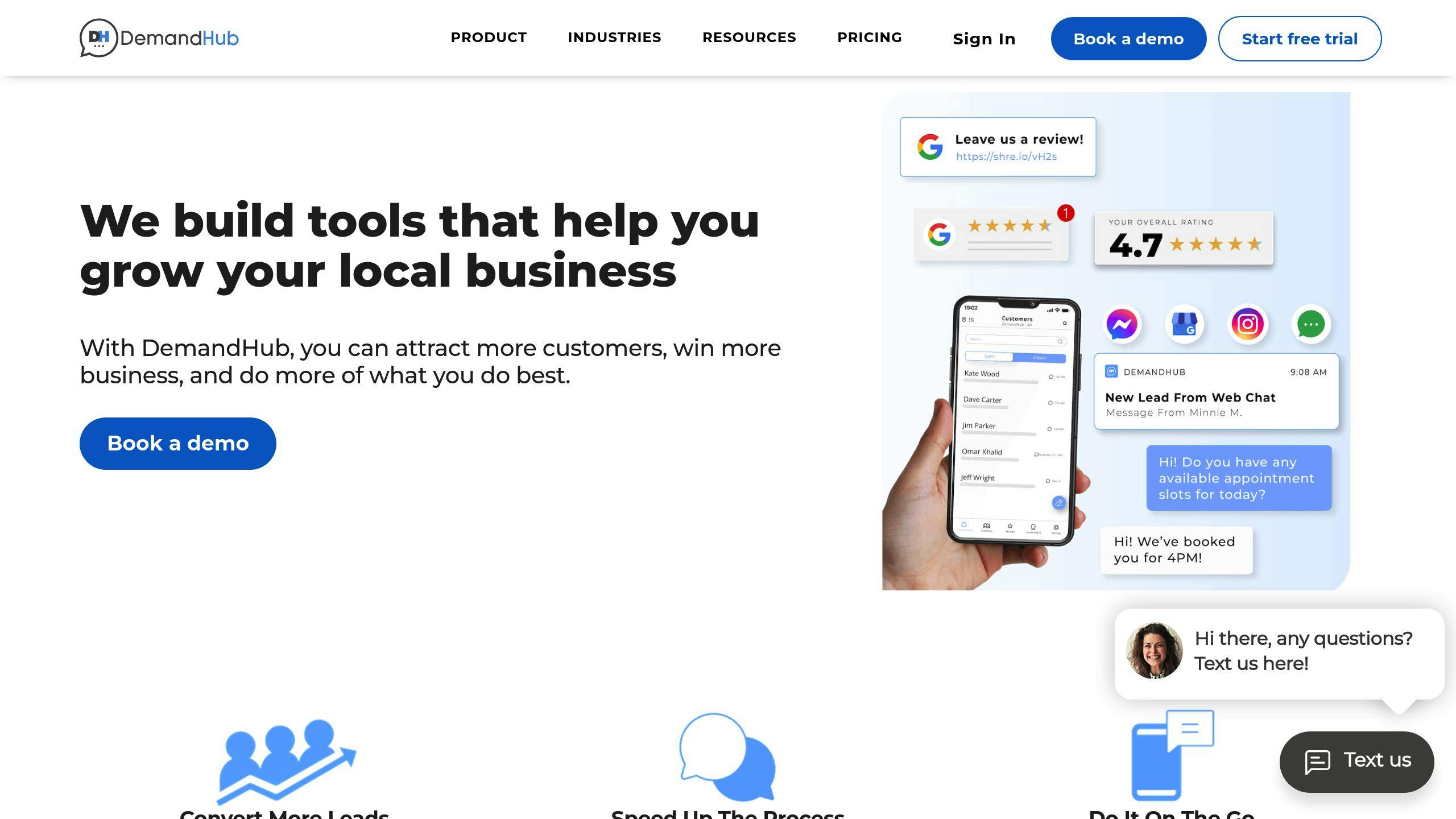
DemandHub helps businesses boost their online reputation and customer engagement. It's packed with features for gathering reviews, improving local search rankings, and increasing visibility.
Here's what DemandHub offers:
- Review generation and monitoring
- Multi-channel communication
- Local search optimization
- Analytics and insights
The standout? A unified inbox. It lets you chat with customers across platforms like text, webchat, Facebook, and SMS. This means faster responses and smoother interactions.
DemandHub also includes:
| Feature | What it does |
|---|---|
| Review requests | Automates invitations to boost Google rankings |
| Appointment scheduling | Lets customers book via text |
| Contactless payments | Processes payments through text |
| Team chat | Improves internal communication |
| Benchmarking | Gives insights from customer feedback |
Pricing? It's quote-based, tailored to your needs. Support is available on weekdays from 9 AM to 6 PM EST via email, chat, and phone.
DemandHub is a solid choice for businesses aiming to up their online game. By automating reviews and streamlining communication, you can focus on what really matters: delivering great customer experiences.
6. Thryv
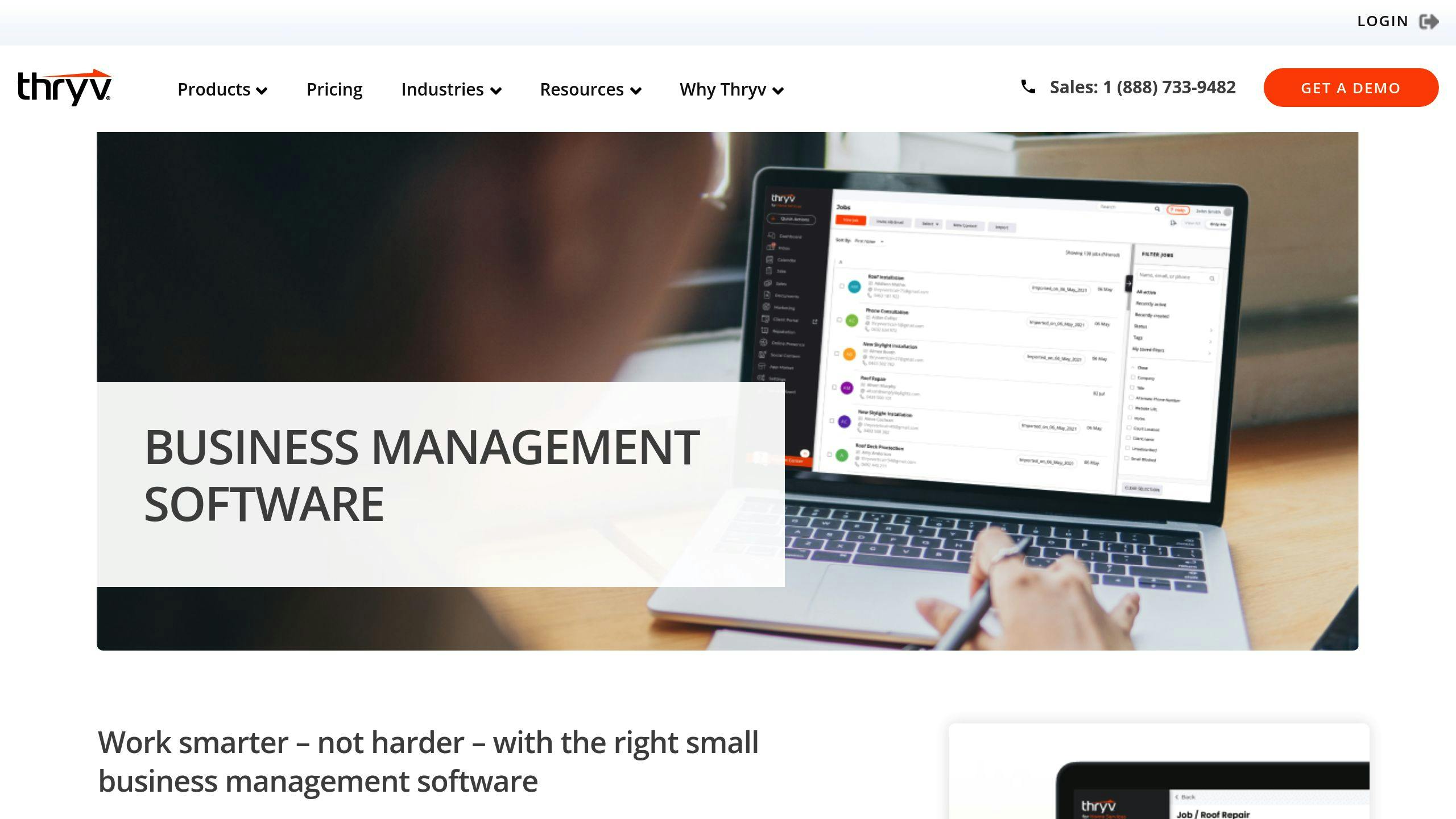
Thryv is a robust tool for small and medium businesses to manage their online reputation. It's packed with features to boost your online presence and handle customer relationships.
Here's what Thryv offers:
- A central inbox for all customer chats
- Business info updates across 40+ online directories
- Review collection and tracking
- CRM tools for customer records
- Marketing tools for campaigns and emails
Thryv's plans come in three flavors:
| Plan | Monthly Cost | What You Get |
|---|---|---|
| Plus | $228 | 5,000 marketing messages, 20GB storage, basic tools |
| Professional | $382 | 10,000 messages, 50GB storage, AI social media captions |
| Unlimited | $533 | Unlimited messages, AI-generated social content |
All plans include listings management and online reputation tools.
One cool feature? Thryv's appointment scheduling. Customers can book services directly, which is great for service-based businesses.
There's also a mobile app for iOS and Android. Send invoices, take payments, and chat with customers on the go.
Need HIPAA compliance? Thryv's got you covered for an extra $29 per month.
sbb-itb-0fc0b25
7. Yext
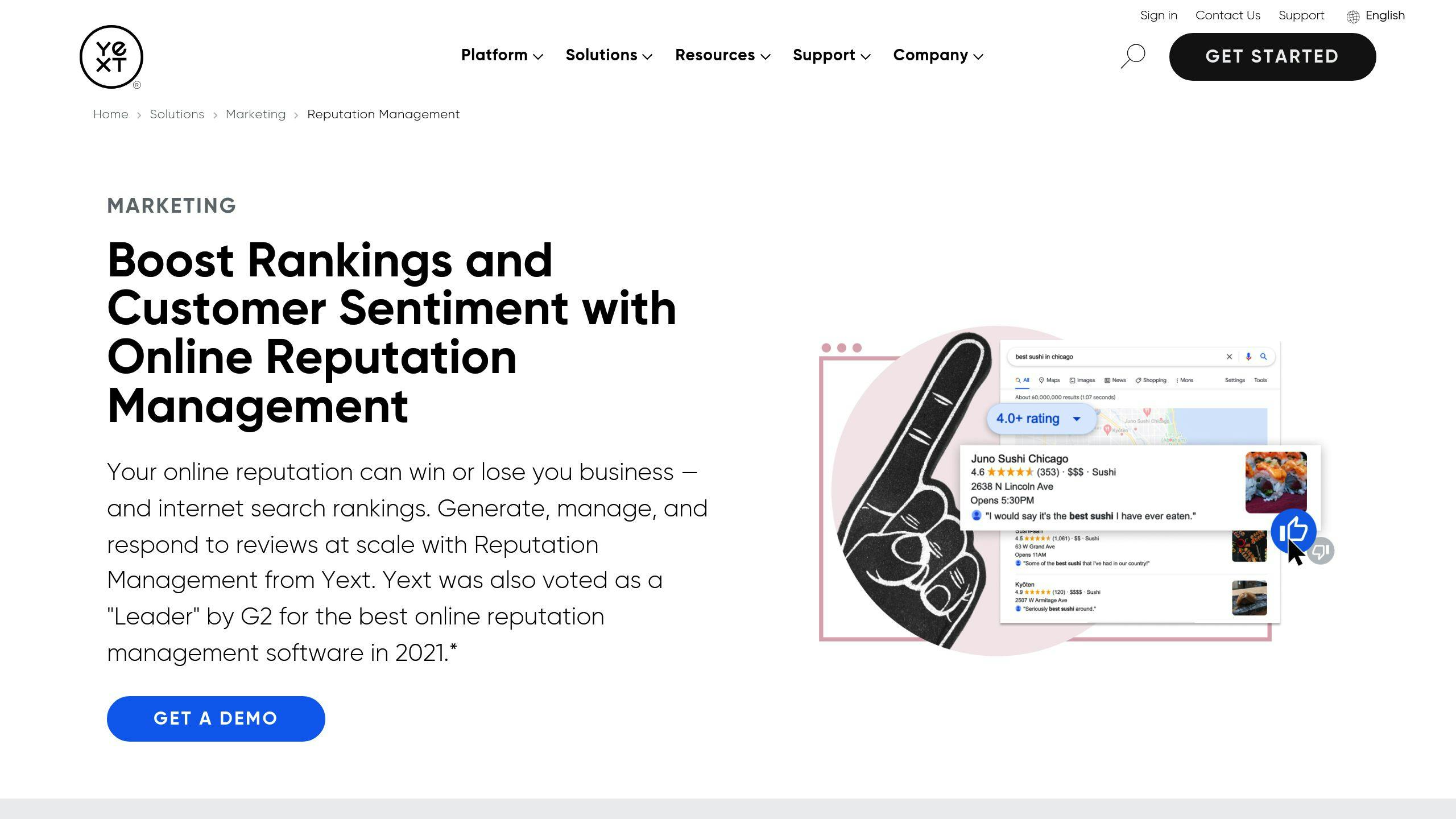
Yext helps businesses manage their online reputation. It's a one-stop shop for review monitoring, customer service, and local listing management.
Here's what Yext offers:
- Track reviews from Google, Facebook, TripAdvisor, and Yelp
- Manage reviews from one dashboard
- Update business info on 50+ online directories
- Spot trends in customer feedback
Yext's PowerListings Network® is great for businesses that move around a lot or are growing fast.
Pricing for small businesses:
| Plan | Annual Cost |
|---|---|
| Emerging | $199 |
| Essential | $449 |
| Complete | $499 |
| Premium | $999 |
But heads up: some users find Yext tricky to use. And if you stop using it, your listings go back to how they were before. That's something to think about.
Is Yext right for you? It depends on what you need and how much you're willing to spend. It can be a powerful tool, but it's not for everyone.
8. Trustpilot
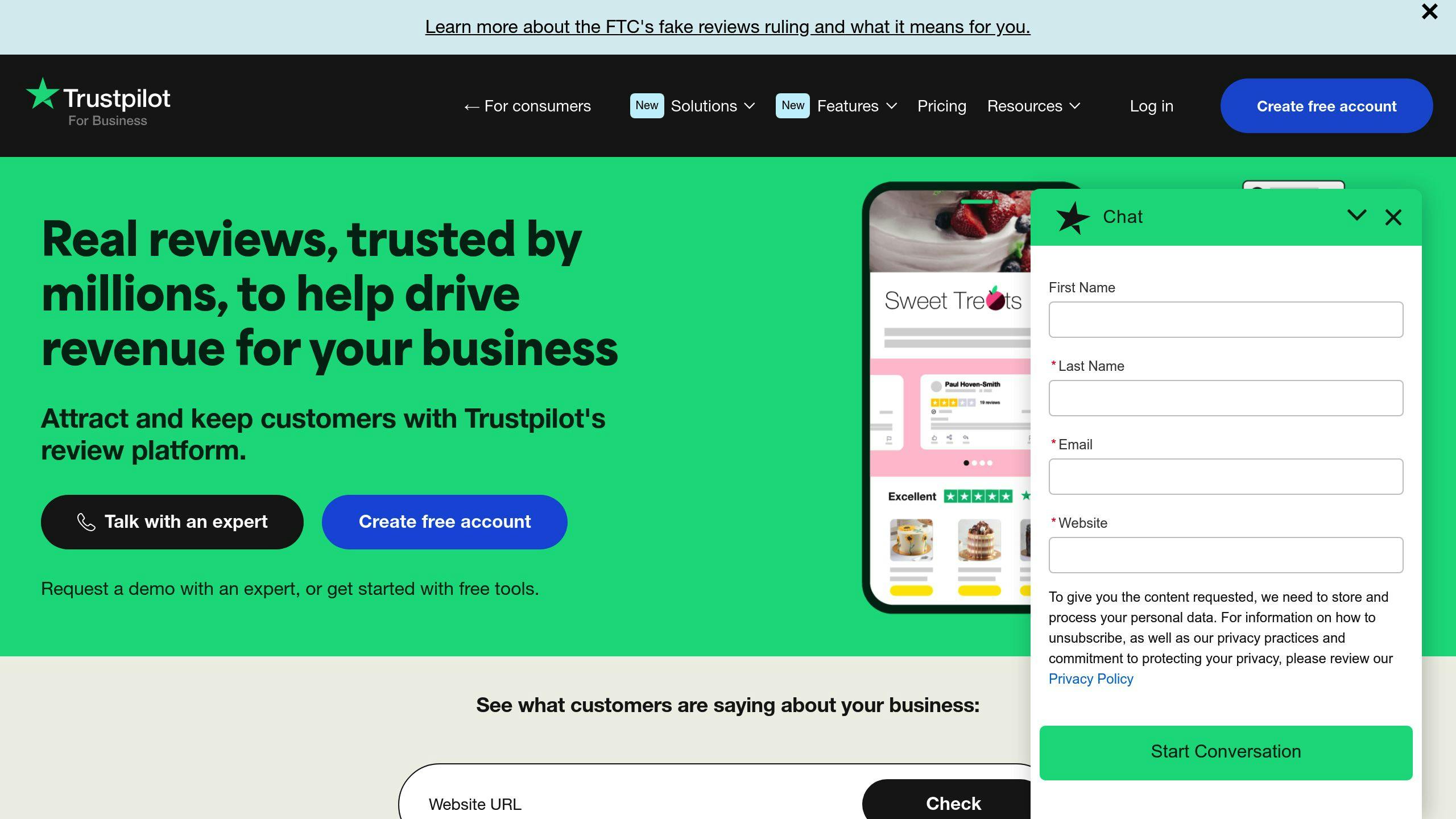
Trustpilot is a big player in online reviews. Customers use it to share thoughts about businesses worldwide.
What's on offer?
- Free plan: Up to 100 review invitations monthly
- Paid plans: Start at $250/month
- Tools to collect and showcase reviews
- Fake review removal
- Image and video reviews
- Social media sharing
- Analytics for customer feedback
Trustpilot's edge? Global recognition and trust.
| Feature | Benefit |
|---|---|
| Review collection | Easy customer feedback |
| Trust score | Shows customer satisfaction |
| Review display | Showcase positives on your site |
| Automated feedback | Streamline review collection |
With nearly a million new reviews monthly, Trustpilot offers serious visibility.
But it's not just about collecting reviews. Use Trustpilot's analytics to spot trends and make smart changes.
Want to build trust fast? Use Trustpilot widgets to show your star rating and review count on your site.
Trustpilot's verified reviews are a standout feature. These proven customer experiences pack a punch for credibility.
Is Trustpilot your match? It depends. The free plan works for small businesses, but more features mean paid options.
9. Podium
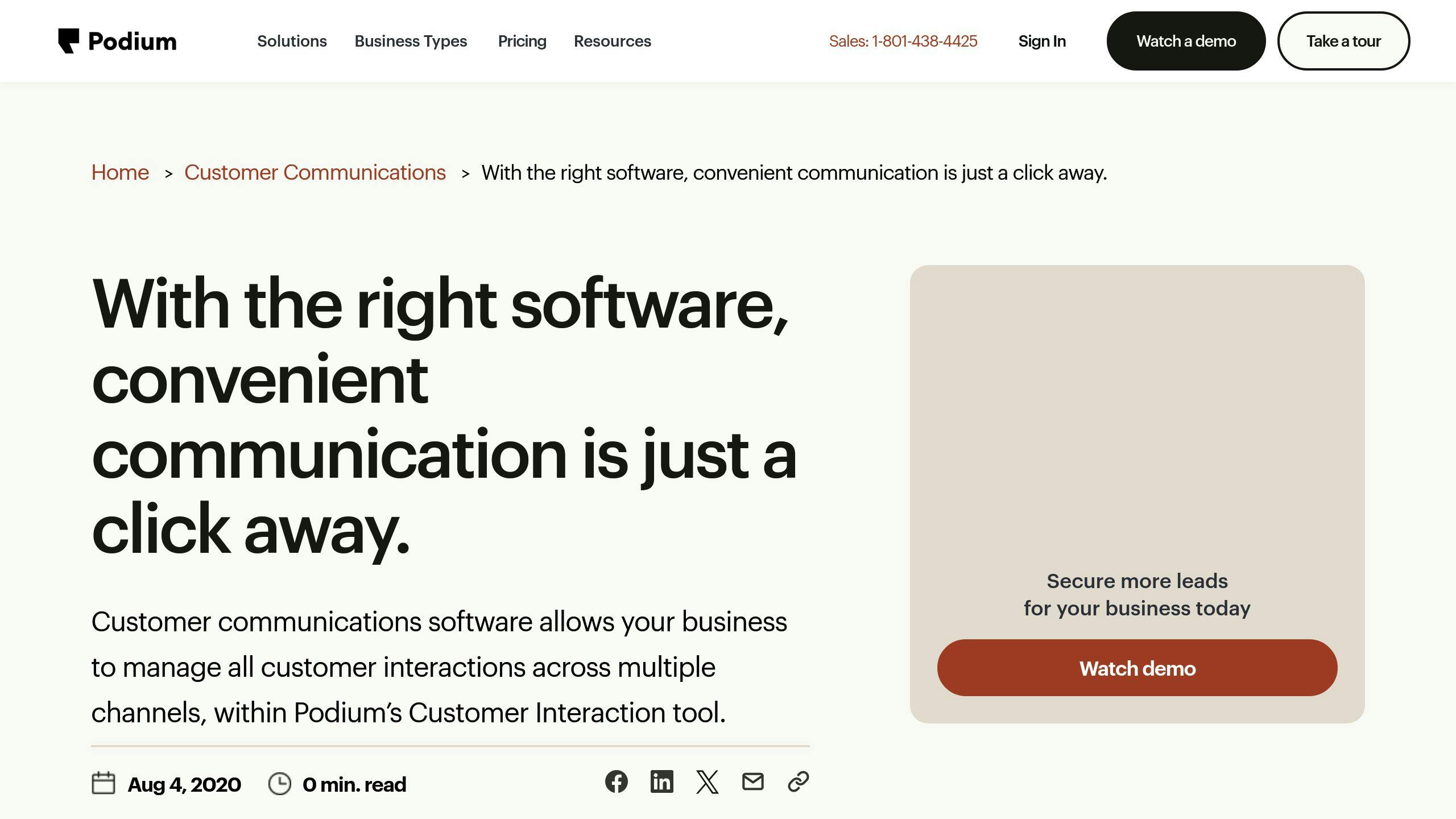
Podium is a tool that helps businesses boost their online reputation and talk to customers better. It's all about making it easy to handle customer chats, online reviews, and text messages.
Here's what Podium does:
- Puts all customer messages in one place
- Helps you get and respond to reviews
- Lets customers pay by text
- Uses AI to answer messages automatically
Podium is really good at getting more reviews. They say their clients usually get 115% more Google reviews after starting to use it.
Podium has different plans:
| Plan | Price | What You Get |
|---|---|---|
| Essentials | $99/month | Up to 75 reviews |
| Review Plus | $249/month | Up to 250 reviews |
| Marketing Plus | $349/month | Up to 500 SMS contacts |
There's also a free version with fewer features.
Real businesses are seeing results. Jimmy Levine, who owns a plumbing company, said:
"We've added almost 800 new reviews (a 4x increase). We're also getting 60+ leads a month coming in from Podium that are converting to new business at an amazing rate."
Podium's AI can write quick, personal replies to reviews. This saves time but still keeps customers happy.
The tool works with over 200 other apps, which is great for managing leads and making your business run smoother. But some people say it's a bit pricey for small businesses, and sometimes messages don't send properly.
Overall, Podium is solid for businesses that want to look better online and talk to customers more easily. It's especially good for local businesses like shops, doctors, and home services.
10. Reputation.com
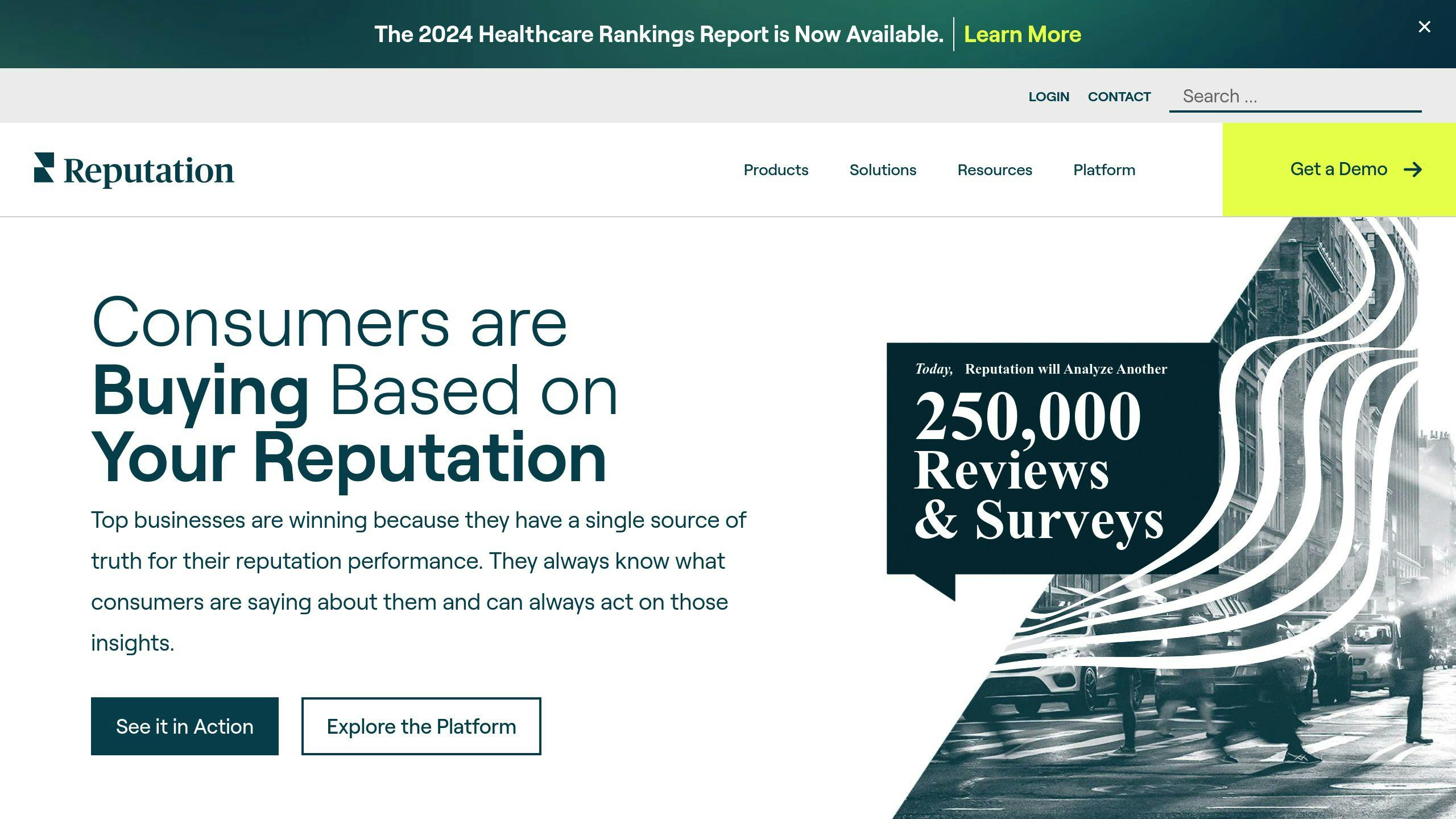
Reputation.com isn't your average online reputation tool. It's a cloud-based platform built for big businesses with multiple locations. Think of it as a command center for managing your online presence and customer feedback.
Here's what makes Reputation.com stand out:
- One dashboard to rule them all: Reviews, social media, customer feedback - all in one place.
- Reputation Score: A quick health check for your brand (100-1,000 scale).
- AI-powered advice: Smart suggestions to boost your customer experience.
But it's not just about watching - it's about doing. You can respond to reviews using templates or custom messages, all from one spot. This saves time and keeps your brand voice consistent across locations.
Want to climb local search rankings? Reputation.com has tools to boost your star ratings and manage reviews for each location. It's a hit with healthcare and automotive businesses.
| Feature | What it does |
|---|---|
| Competitor comparison | See how you measure up |
| Sentiment analysis | Get the vibe of customer feedback |
| Social media management | Handle all your platforms |
| API connections | Link with Salesforce, Facebook, and more |
Real businesses are seeing results. Sara Schleske from Livermore Ford says:
"We use Reputation.com across our whole organization. It helps us respond to reviews - both good and bad."
Reputation.com doesn't share its prices publicly. It's clearly aimed at bigger operations. If you're a small business, it might be overkill. But for nationwide companies like Nissan or US Bank? It's the go-to tool for managing a complex online presence.
Comparing Reputation Management Tools
Let's break down some top online reputation management tools:
| Tool | Key Features | Pricing (Monthly) | Pros | Cons |
|---|---|---|---|---|
| Brand24 | Mention feed, Sentiment analysis, Alerts | $49 - $249 | Tracks 25 million sources, 108 languages | Pricey for advanced features |
| Reputation.com | Automated review solicitation, Customer sentiment insights | Custom | Comprehensive for large businesses | Might overwhelm small businesses |
| Yext | Business listing sync, Review management, Local SEO | $48 per location | Strong local SEO focus | Adds up for multiple locations |
| Trustpilot | Transparent review collection, TrustBox widgets | Custom | Well-known trust symbol | Limited free features |
| Podium | Webchat, Review generation, Team collaboration | Custom | All-in-one customer interaction | No public pricing |
| BirdEye | Social media engagement, AI-driven surveys | Custom | Comprehensive customer experience features | Complex setup |
| Grade.us | Multi-channel review monitoring, Custom review generation | $40 per seat/month | User-friendly interface | Costly for small businesses |
Choosing your tool? Consider:
- Your budget (tools range from $40 to $250+ monthly)
- Business size (some cater to big enterprises, others to small businesses)
- Must-have features
- User-friendliness
- Integration with your current software
Here's what Sara Schleske from Livermore Ford says:
"We use Reputation.com across our whole organization. It helps us respond to reviews - both good and bad."
Bottom line: Most solid reputation management tools need a paid subscription for full access. Pick one that fits your specific needs and budget.
Tips for Using Reputation Management Software
Here's how to make the most of your reputation management software:
1. Set up alerts
Create Google Alerts for your company and competitors. It's a simple way to stay on top of new reviews and mentions.
Webroot, an internet security company, used alerts to respond to 70% of low-rated reviews. This improved their shopping experience and made their brand more human.
2. Respond fast
Aim to reply within 24-48 hours, especially for negative reviews. Why? 54% of shoppers expect a response when they write a bad review.
3. Make it personal
Use the customer's name and address their specific issues. It builds trust and shows you care.
Boots, a pharmacy chain, saw a 186% jump in purchase intent when they responded to negative product reviews with personalized explanations.
4. Handle negative feedback like a pro
When you get a bad review:
- Keep your cool
- Say sorry (40% of reviewers want an apology)
- Offer a fix or take it offline
- Use the feedback to get better
5. Ask for good reviews
Don't be shy - ask happy customers to leave reviews on Google, Yelp, and TripAdvisor. It balances out the negative stuff.
6. Keep an eye on things
Check your review sites often. It helps you understand what people think about your brand.
7. Use feedback to improve
Reviews are gold mines of insight. Use them to spot and fix problems. When you respond, explain how you're addressing the issue.
| Action | Impact |
|---|---|
| Respond to negative reviews | 89% of consumers read these responses |
| Personalize responses | Can boost purchase intent by up to 186% |
| Set up alerts | Allows for quick response to new reviews |
| Encourage positive reviews | Helps balance overall brand perception |
What's Next in Online Reputation Management
The online reputation management landscape is changing fast. Here's what's coming:
AI-Powered Monitoring and Analysis
AI tools are getting better at tracking brand mentions online. They can:
- Scan massive data sets quickly
- Identify customer feedback trends
- Grasp context and tone in reviews
AI sentiment analysis can now even detect sarcasm in comments. This helps brands respond more accurately to customer issues.
Voice Search Optimization
With voice assistants on the rise, brands need to adapt. This means:
- Using conversational keywords
- Creating question-answering content
- Ensuring mobile-friendly websites
User-Generated Content (UGC) Platforms
Brands are leveraging customer-created content more than ever. UGC builds trust and showcases real experiences. Ways to use UGC include:
- Sharing customer photos on social media
- Featuring reviews on websites
- Running content submission contests
Proactive Crisis Management
Companies are focusing on prevention. This includes:
- Setting up brand mention alerts
- Creating scenario-specific response plans
- Training staff for quick online issue handling
Ethical Reputation Management
Customers care about brand values and actions. To build trust, companies are:
- Being transparent about practices
- Taking stands on social issues
- Showcasing community improvements
Personalized Branding Strategies
One-size-fits-all is out. Brands are tailoring their online presence to individual customer interests:
- Creating segment-specific content
- Using AI for customized website experiences
- Adjusting messaging based on customer data
Emerging Social Platforms
New social media sites emerge constantly. Brands must stay alert and identify which ones matter for their audience. TikTok, for example, became crucial for many businesses recently.
Data Privacy and Protection
With increased focus on online privacy, reputation management now includes data handling. Companies are:
- Updating privacy policies
- Giving users more data control
- Being transparent about data usage
Influencer Reputation Management
As influencer marketing grows, so does the need to manage influencer reputations. Brands are:
- Vetting influencers more thoroughly
- Monitoring influencer actions and content
- Establishing influencer partnership guidelines
Staying on top of these trends can help brands build and maintain a strong online image in this ever-evolving landscape.
Wrap-up
Your online reputation can make or break your business. Here's why:
- 98% of people read online reviews
- 93% say reviews impact their buying decisions
That's huge. Your online image directly hits your bottom line.
ORM isn't just nice to have. It's a must. Here's what it does:
- Shapes how people see your brand
- Builds trust with customers
- Helps you handle potential crises
Using ORM tools lets you:
- Track brand mentions everywhere
- Respond fast to feedback
- Push positive content up in search results
Your online reputation is like digital cash. Don't ignore it. Use these ORM tools now to control your brand's image and grow.
Key takeaways:
- Act first, don't just react
- Talk to customers regularly
- Use bad feedback to get better
Remember: Your online reputation never stops. But with the right tools, you can turn it into a powerful business asset.


